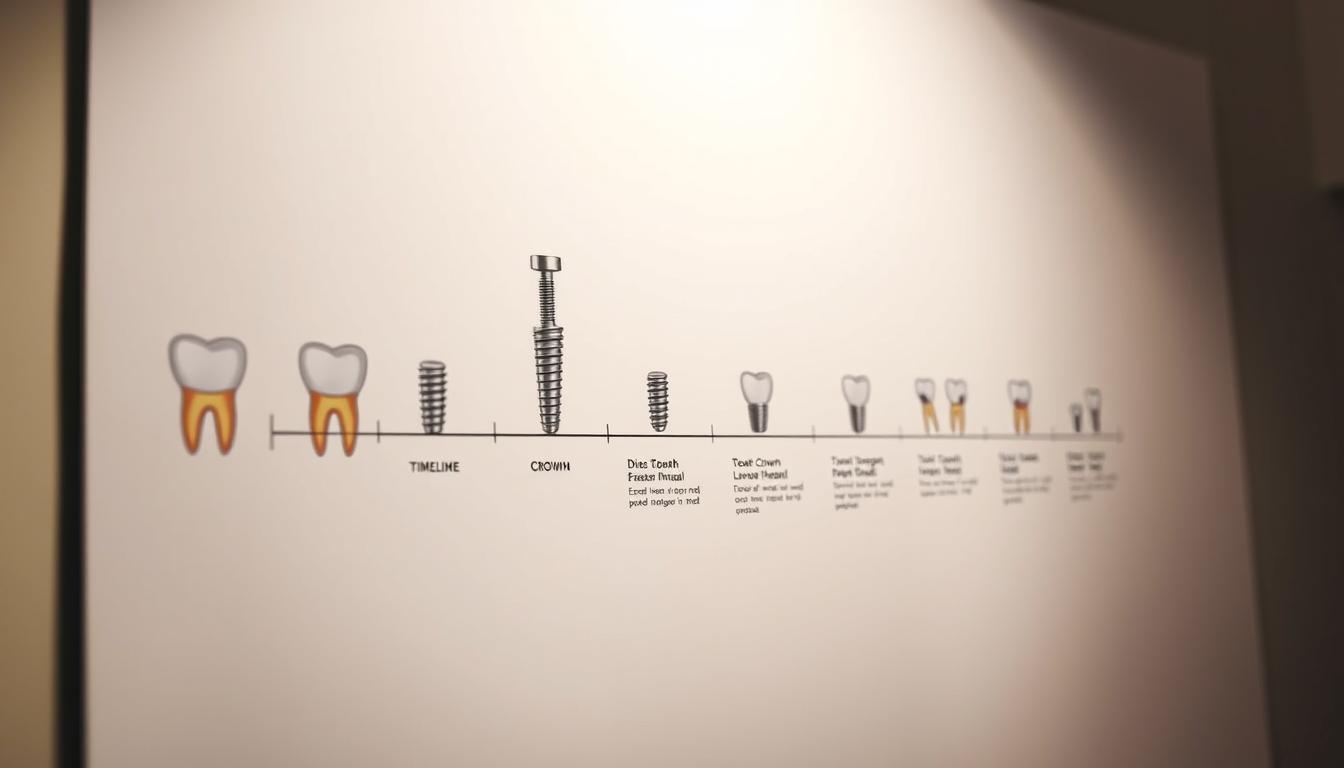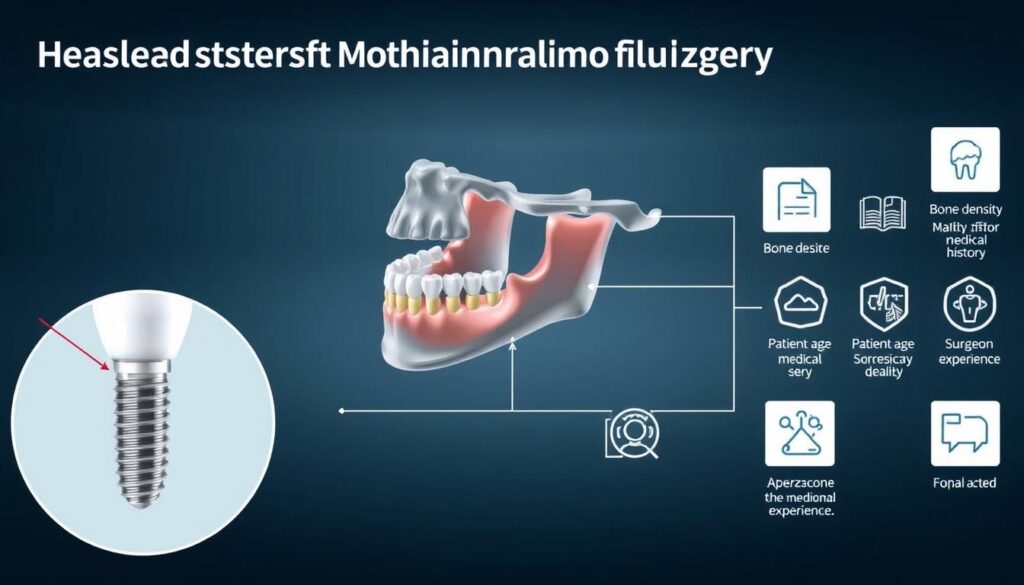How Long Does Implant Surgery Take?

Every year, over 5 million dental implants are placed in the United States. This shows a huge demand for a procedure that combines need with modern tech. Yet, the dental implant surgery timeline varies greatly. The process, which brings back smiles and chew function, includes many steps spread over months. These range from the first tooth removal to putting in the new tooth.
Knowing how long implant surgery takes is key for those thinking about this beneficial treatment. Every step, from inserting the metal post in the bone to adding the fake tooth, is planned out. This ensures the implant heals well in the jawbone. It’s a detailed process, made to fit each person’s different dental needs.
The implant surgery time frame isn’t the same for everyone. It is a custom timeline. Sometimes, extra steps like bone grafting are needed if the jawbone isn’t ready for the implant right away. Going through the timeline for dental implant surgery can take a while. But, the final outcome shows the amazing ability of today’s dentistry to copy nature’s own making.
Key Takeaways
- Dental implant surgery involves a series of outpatient procedures stretched over several months.
- The duration of the procedure depends on individual factors including bone healing and necessity for additional surgeries.
- A thorough understanding of the dental implant surgery timeline allows for realistic expectations and scheduling.
- Healing time is critical between stages to ensure successful integration of the implant.
- Advanced planning and patience are essential for the overall timeline for dental implant surgery.
Understanding Implant Surgery
Implant surgery is more than a medical step; it’s a game-changer for those missing teeth. It introduces metal posts or frames into the jawbone under the gums. This sets the stage for new teeth that look just like your own.
The journey of dental implant surgery is fascinating. It’s all about replacing lost teeth and maintaining oral health. It keeps replacement teeth steady and safeguards against bone loss. This protects the shape of your face and keeps your mouth healthy. Plus, it helps you speak clearly and comfortably, issues often seen with dentures.
What is Implant Surgery?
Dental implant surgery swaps tooth roots with metal posts, usually titanium. These act as anchors for new teeth. It’s perfect for those who’ve lost a tooth to disease, injury or any other cause. It looks and feels better than dentures or bridges.
Types of Implant Surgery
There are different dental implant surgeries for various needs and bone conditions. The main kinds are endosteal implants, which go directly into the bone, and subperiosteal implants, sitting under the gum but on top of the jawbone. This choice is crucial for people with not enough bone height or density. They might need bone grafting first.
Reasons for Implant Surgery
Many reasons lead people to choose dental implant surgery. Thinking about the dental implant surgery duration and dental implant procedure length is key. It’s popular because it’s trusted to restore jaw stability and prevent bone loss. It feels like having natural teeth and improves oral health.
Knowing how long the surgery and recovery takes is vital for patients. It helps them plan out their time. With a high success rate and lasting results, dental implant surgery stands as a top choice. It lets people get back their smiles and oral health.
The Implant Surgery Procedure
Starting dental implant surgery needs careful planning and knowledge. It involves steps from preparing for surgery to taking care after it. Each step is key for a good result.
Pre-Surgery Preparations
Preparing for the surgery starts well before the procedure. You’ll need dental checks including X-rays and maybe 3D scans. This is to plan the surgery based on your jaw structure and where implants will go. It helps avoid problems by planning for your specific needs.
- Review of medical history to avoid any systemic health conflicts.
- Pre-surgical dental cleaning to minimize the risk of infection.
- Detailed discussion on the dental implant surgery timeline, setting realistic expectations for the patient.
The Surgical Process
The surgery is key and might happen in parts. It first involves removing any bad teeth and getting the jawbone ready, which could include adding bone if needed. Then, the implant goes into the jawbone. It needs time to heal before adding the abutment and fake teeth.
Post-Surgery Care
Once the implant is in place, taking care of it is crucial. This part is vital for healing. It involves treating pain and swelling with meds and eating soft foods.
- Routine follow-ups to monitor the healing and osseointegration.
- Maintaining excellent oral hygiene to prevent infection.
- Immediate attention to any signs of discomfort or unusual symptoms post-surgery.
Summing up, it’s key to fully understand and follow each step of dental implant surgery. From prep to surgery, to aftercare, each part is necessary for ideal results and the implant’s longevity.
Factors Influencing Surgery Duration
Knowing what affects the time of dental implant surgery matters for patients and doctors. Many things play a role in the length of the surgery. This includes the dentist’s plans and the patient’s dental health.
The type of implant used is important. There are different kinds like endosteal and subperiosteal. Each one takes a different amount of time to place. For a deeper look at dental implants, check out this informative article.
The surgeon’s experience is also key. Skilled surgeons tend to do the job quicker than those with less experience. However, the quality and safety of the surgery are most important.
The complexity of the case greatly affects the time needed. For example, surgeries needing many implants or bone grafting need more time. This is because they require careful work and precision.
Here’s a table showing how these factors might change surgery time:
| Factor | Impact on Surgery Duration |
|---|---|
| Type of Implant | Varies from short to extended time, depending on implant choice |
| Surgeon’s Experience | Lesser time with more experienced surgeons |
| Case Complexity | Increased complexity can significantly lengthen surgery duration |

Understanding dental implant surgery duration factors is important. It helps patients know what to expect. It also ensures they are ready for the surgery and recovery.
Average Duration of Implant Surgery
Many people wonder how long dental implant surgery takes. This info helps in planning for recovery and setting expectations. The time needed varies greatly, depending on the case and surgery type.
Usually, putting in a single implant takes 1 to 2 hours. But, it’s important to realize this is just the active surgery time. The whole implant process, from the first check-up to full healing, usually takes 3 to 6 months. This time allows the implant to securely join with the jawbone.
Variations Based on Procedure Type
Dental implant surgery times differ greatly depending on what’s needed. For example, a simple implant in a person with good bone density takes less time than if bone grafts or sinus lifts are needed. The table below shows how different needs impact surgery and healing times:
| Type of Procedure | Estimated Surgery Time | Additional Time for Healing |
|---|---|---|
| Single-stage Implant | 1-2 hours | 3-6 months |
| Multi-stage Implant | 1-2 hours | 6-9 months |
| Immediate Load Implant | 1-2 hours | 3 months |
| Implant with Bone Grafting | 2-4 hours | 6-12 months |
This table helps us understand how surgery type affects both the surgery duration and healing time. It’s best to talk with a dental expert for an estimate that fits your specific treatment plan.
Recovery Time After Implant Surgery
The journey to full recovery after dental implant surgery includes immediate and long-term healing phases. Both are essential for the implant’s success. Knowing about the healing process helps patients have realistic expectations and better outcomes.
Immediate Recovery Period
The first days after surgery are critical for managing discomfort and preventing complications. Symptoms like swelling, bruising, and slight bleeding are common. Patients can usually handle these with prescribed medications and by following post-op instructions. During this time, it’s best to eat soft foods and limit physical activity to speed up recovery.
Long-Term Healing
Long-term recovery focuses on osseointegration, where the bone wraps around the titanium implant. This phase is crucial for the implant’s stability and can take three to six months. To ensure the implant sets well, maintain great oral hygiene and have regular dental check-ups.
Every step of the healing process is important for the implant’s durability and function. Recovery times vary based on the patient’s health, the complexity of the dental work, and following the dentist’s care instructions.
Risks and Complications
Dental implant surgery is mostly successful, but it does come with possible risks. It’s important to know these risks and how to lower them. This knowledge is a key part of getting dental implants.
Common Risks Associated with Surgery
Dental implant surgery has some risks, just like any surgery. These risks include getting an infection, harming nearby teeth or blood vessels, causing nerve damage that might make you feel numb or pain, and problems with the sinuses, especially with implants in the upper jaw. Even though big problems are rare, everyone getting implants should understand these risks.
How to Minimize Risks
To cut down on risks, start by picking a seasoned dental surgeon. They are less likely to encounter complications. Following all the care directions before and after surgery is also key. Besides, good oral hygiene and stopping smoking can speed up healing and lower the risk of issues.

| Risk | Potential Complication | Preventive Measure |
|---|---|---|
| Infection | Prolonged healing, additional surgeries | Antibiotics, meticulous post-op care |
| Nerve damage | Persistent numbness, discomfort | Advanced imaging, precise surgical techniques |
| Sinus issues | Sinusitis, migration of implant | Proper implant placement, sinus lift if needed |
| Damage to nearby structures | Impact on adjacent teeth, blood loss | Careful planning, use of guided surgery techniques |
Importance of Choosing a Qualified Surgeon
Choosing the right surgeon for dental implant surgery is very important. A well-chosen surgeon affects how well the implant works and how long it lasts. Make sure to check their background carefully.
Credentials to Look For
Look for a surgeon trained in oral and maxillofacial surgery, periodontology, or prosthodontics. These are key areas for dental implants. It’s also important to check if they are board certified and how much experience they have with implants.
| Qualification | Details | Importance |
|---|---|---|
| Board Certification | Confirms surgeon has met nationally recognized standards for education, knowledge, experience, and skills to provide high-quality care in the field of surgery. | Essential for ensuring competent and safe practice |
| Specialized Training | Includes specific educational courses and practical experience in implant surgeries. | Crucial for handling complex cases and ensuring proper implant placement |
| Clinical Experience | Years of active practice in performing implant surgeries, number of successful implantations performed, and handling of diverse cases. | Builds practical knowledge and adaptability in real-world scenarios |

At your first meeting, ask about the surgeon’s experience and success with implants. Learn how they deal with issues that may come up. This helps you understand their skill and makes you feel more confident.
When you take your time to gather all the information, you ensure you pick the right surgeon for your needs. This careful choice lessens risks and helps your dental implant surgery succeed.
Managing Pain After Implant Surgery
After getting dental implants, managing pain is super important for healing and feeling satisfied with the procedure. Knowing the different ways to ease pain helps patients and their caregivers make smart choices for managing it.
Controlling pain after dental implant surgery usually involves medicines and simple home care. Following your dentist’s advice on medications is key to a good recovery and less pain.

Pain Management Options
- Prescription pain relievers: Stronger than over-the-counter options, these are often prescribed for initial post-operative days.
- Over-the-counter pain relievers: Medications such as Tylenol or Advil can be effective for managing mild to moderate post-implant surgery pain.
- Ice packs: Applying cold compresses can reduce swelling and numb the area, providing temporary pain relief.
- Rest: Adequate rest is essential for healing and can indirectly help manage pain by allowing the body to recover faster.
When to Contact Your Doctor
If your pain relief methods aren’t working, or if your pain, swelling, or soreness gets worse or stays too long, it’s critical to see your dental surgeon. It might mean there are complications that need more care or changes to your pain management plan.
| Symptom | Recommended Action |
|---|---|
| Increase in pain | Consult your dentist immediately |
| Persistent swelling | Seek professional advice |
| Pain not subsiding with medication | Discuss alternative pain management |
Being proactive about managing pain after implant surgery and knowing when to get help are critical. They not only help reduce pain but also lead to better dental health and function.
Follow-Up Appointments
After getting a dental implant, follow-up appointments are key. They make sure everything is going as planned. These check-ups help catch and fix any problems early.
At these post-surgery appointments, your dentist looks at how well the implant fits. They check if the implant is stable, how your gums are, and if you’re keeping up with cleaning your mouth. Sometimes, they might change how they tell you to take care of your implant.
These visits are also a chance for you to talk about any worries. You can ask questions if you’re feeling pain or unsure about something. Talking about these issues can make you feel better and help your healing.
- The first check-up is usually within two weeks after your surgery to look for any early issues.
- More visits might happen over a few months to make sure the implant is becoming part of your jaw correctly.
- It’s a good idea to have a yearly check-up to keep an eye on the implant’s long-term health.
If you want to know more about follow-ups and how they fit into the bigger picture, you might like to read detailed blog articles on this topic.
Lifestyle Adjustments Post-Surgery
Making changes to your lifestyle after getting an implant is key to a good recovery. It’s important for patients to pay close attention to how they live after the surgery. Changes should help with a better and faster healing process. Let’s look at important areas where changes are needed.
Dietary Changes
Your body needs more nutrients to heal after implant surgery. Eating the right foods speeds up healing and prevents problems at the implant site. Here are some diet tips:
- Soft Foods: At first, eat soft foods that don’t need much chewing. This helps avoid pressure on the implant.
- Nutrient-Rich Foods: Foods full of vitamins and minerals help your body heal itself.
- Avoid Harmful Substances: It’s vital to stop smoking and drinking alcohol. These can slow down healing and cause complications.
Activity Restrictions
It’s important to avoid certain activities to keep your recovery smooth:
| Activity Type | Recommendation |
|---|---|
| Heavy Lifting | Don’t do any lifting that could hurt the surgery area. |
| High Impact Sports | Stay away from sports that could cause sudden or harsh movements. |
| Exercise | Start with easy walks, then slowly do more as your doctor says it’s okay. |
Preparing for Your Implant Surgery
Getting ready for a dental implant means being well prepared. This ensures a smooth surgery and recovery. By knowing what to do before your surgery, you can feel less worried and heal better. We’ll show you how to get ready for your implant surgery, including a detailed implant surgery preparation checklist.
First, being physically ready is key. You’ll need a personalized list for this. This list should cover getting exams before surgery, knowing all about your surgery, and planning for after it. Make your living space recovery-friendly to ease your healing process. Having things you need within reach and a comfy spot set aside helps a lot.
- Scheduling a pre-surgical medical check-up.
- Learning about what your surgery will involve.
- Organizing a ride and someone to help you after the surgery.
- Getting your house ready for when you come back from surgery.
Being ready in your mind is just as important. Surgery can seem scary, so it’s key to prepare mentally. Talk with your dental team to feel more secure and know what to expect.
- Having realistic views about the surgery and its results.
- Getting your mind ready for recovery and any discomfort.
- Thinking about how taking it easy after surgery will affect your life.
Last, go over the implant surgery preparation checklist again and again before your surgery. This helps make sure you don’t miss anything important. Getting ready well can make your surgery go smoother and help you heal faster. Remember, good preparation for dental implant surgery is the start to getting better quickly.
Insurance and Costs
Dental implant surgery can be expensive. So, it’s important to know how insurance can help with the costs. In this section, we talk about insurance coverage and what affects the price of dental implants in detail.
Dental implant insurance is complex and varies widely. It doesn’t usually pay for everything. Many times, it only covers part of the cost. That’s why you need to carefully check your insurance plan. For more info, look into implant surgery coverage options.
The price of implants can change for many reasons. The type of dental problem and where you live can affect the cost. Talk openly with your dentist about possible costs. This includes the cost of the implants and any extra surgery you might need, like bone grafting.
- Type of implant and materials used: High-end materials can significantly increase costs.
- Number of implants: More implants mean higher costs.
- Additional surgical needs: Procedures like extraction or bone grafting add to the overall expense.
Knowing what questions to ask about insurance and payment options can reduce worry about the costs. Make sure to talk about the long-term benefits and costs of your treatment plan with your dentist.
Patient Testimonials
Exploring dental implant patient testimonials takes us deep into the stories of people and their implant surgeries. They share not only about the surgery but also their feelings and healing process. This helps future patients know what they might go through.
These stories are very important for people thinking about getting dental implants. They show what to expect and the tough parts of the process. Reading them can help someone prepare better for their own surgery.
“Hearing how others coped with their surgery and recovery phases encouraged me to maintain diligent post-operative care and embrace the journey with optimism.”
Collecting these stories builds a community and shows the emotional support patients feel. They talk about how dental implants changed their lives for the better. This includes eating easier and feeling more confident.
To understand more, let’s look at common points in dental implant patient testimonials:
- Initial doubts and fears dispelled by post-surgery satisfaction
- The critical role of skilled dental professionals in ensuring a smooth process
- Personal growth and enhanced self-esteem following the successful integration of implants
- The importance of following detailed care instructions post-surgery
Together, these stories highlight the lessons learned by patients. They show why making informed choices and choosing the best surgeon matters. They offer real advice and encouragement, giving new patients the confidence they need for their dental implant journey.
Advancements in Implant Technology
The world of implant surgery is changing a lot. This is thanks to dental implant technological advancements and implant surgery innovations. These upgrades are making surgeries safer, more effective, and more comfortable for patients.
Thanks to recent breakthroughs, new techniques in surgery are being introduced. For example, digital imaging now allows for super precise implant placement. This boosts the success rate of surgeries.
| Innovation | Impact on Surgery |
|---|---|
| 3D Imaging | Enables precise planning and placement of implants |
| Biocompatible Materials | Improves osseointegration and durability of implants |
| Minimally Invasive Techniques | Reduces recovery time and post-surgery discomfort |
Looking ahead, dental implants are moving towards less invasive methods. These methods lower surgical risks and help patients recover faster. The advances in dental implant technological advancements are set to change patient care for the better.
FAQs About Implant Surgery
We are always working to improve medical science and teach about regenerative medicine. We know people have questions about dental implant surgery. Answering these questions helps everyone understand better. This understanding helps patients and doctors make good choices about treatment. There are many FAQs about dental implants. They cover how long implants last, how they work with the body, and how health issues might affect success.
Common Questions Answered
Many want to know how long dental implants will last. With the right care, top-notch implants can last a very long time. People also worry about implants not working or being rejected. Research shows the chances of this happening are low. However, risks can go up if you smoke or have diabetes that’s not under control. We give clear answers to these and more questions, based on the latest science.
Resources for Additional Information
If you’re looking into getting dental implants, there are lots of resources to help. Trustworthy dental groups, skilled dentists, and science journals are great for information. We suggest you check out these sources for detailed knowledge about implants. This can help you get a better idea of how implant technology can boost dental health. Being well-informed is crucial for understanding implant surgery and getting the best care.


